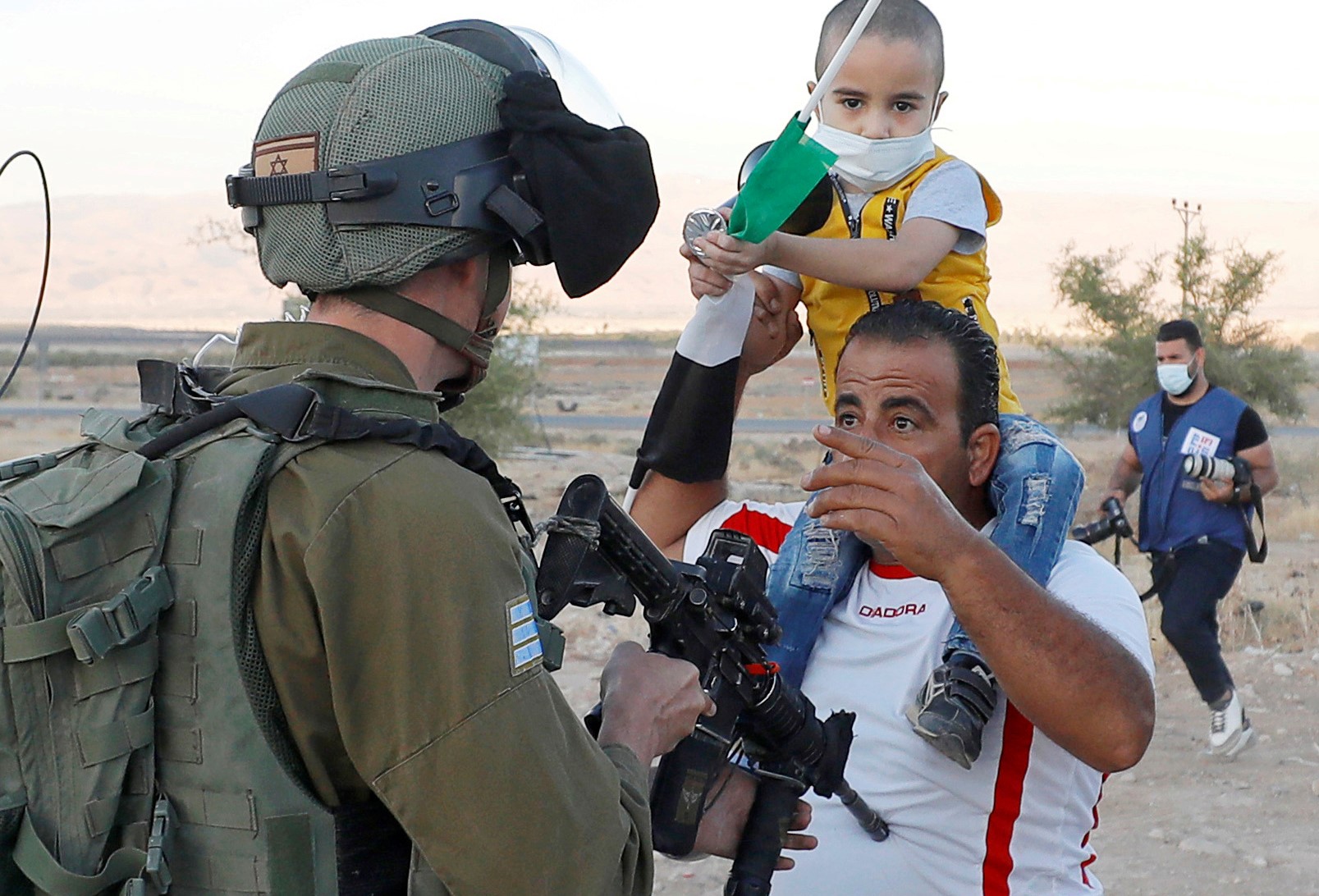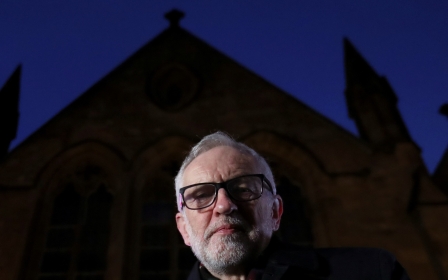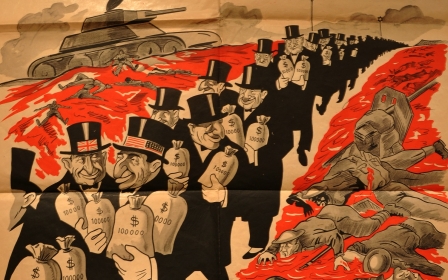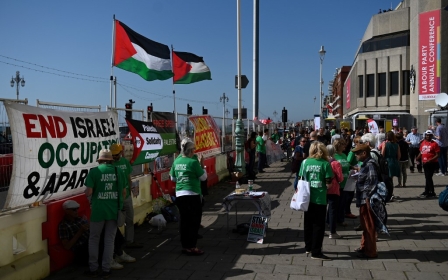How Israel's propaganda war has silenced Europe
The UK Labour Party’s shadow education secretary, Rebecca Long-Bailey, was recently sacked after sharing an article on social media saying - among other things - that Israel had trained US police in the knee-on-neck choking method used on George Floyd.
This claim has been circulated widely in recent weeks among the global left. Labour leader Keir Starmer accused Long-Bailey of posting an article containing an “antisemitic conspiracy theory”. Evidently, the winds of change have come to Labour after Jeremy Corbyn stepped down - and the change does not portend well.
Daring to blame Israel
Middle East Eye on 25 June published details of the controversial article, with fact-checking. The accusation that it was from Israel that US police learned the choking method that led to Floyd’s death is unfounded. Police in the US have been frighteningly trigger-happy for decades where Black citizens are concerned - since long before the state of Israel was founded and its police force established.
US police certainly do not need Israeli expertise to be capable of killing innocent Black civilians in shockingly large numbers.
When it comes to criticism of Israel, the rules of the game in Europe are different. There is Israel, and then there is the rest of the world
Still, the worrisome speed with which Long-Bailey was replaced in the shadow cabinet ought to be much more troubling to supporters of human rights than the credibility of any article she posted online. Long-Bailey was fired only because she dared to share an article that blamed Israel, not because she dared to share an article lacking a factual foundation.
It is doubtful that Starmer is all that concerned about the reliability of articles shared by members of his faction. He is much more worried by the antisemitic image that has adhered to his party, not always justifiably.
Even if the article’s accusations were fabricated and entirely baseless, it remains highly doubtful that Long-Bailey would have been sacked in that manner had she posted false accusations against any other country on Earth, apart from Israel. When it comes to criticism of Israel, the rules of the game in Europe are different. There is Israel, and then there is the rest of the world.
Effective Zionist propaganda
Israeli propaganda in recent years has had marked success in Europe. Long-Bailey’s sacking is just another link in a long chain of its achievements. Lately, under the direction of a relatively new minister for strategic affairs in the Israeli government - along with the close cooperation of the Zionist establishment in the rest of the world - Zionist propaganda has adopted a new strategy, which has proven itself unprecedentedly effective.
Israel and the Zionist establishment in various countries have begun branding all criticism of Israel as antisemitic. This has silenced Europeans. Propagandists for Israel cynically exploit Europe’s guilty feelings about the past that still linger, often with good reason - and the accusations have done their job.
It remains difficult to criticise Israel, the occupation, accompanying war crimes, breaches of international law, or Israel’s treatment of Palestinians; it is all branded as antisemitism and quickly disappears from the agenda. Alongside this campaign of branding, most Western nations, including the US, have passed sweeping legislation that aims to declare war on the completely legitimate boycott, divestment and sanctions (BDS) movement, in an attempt to criminalise its activities and its activists.
How incredible that this struggle against an occupation and its legal infrastructure is undergoing sustained delegitimisation and criminalisation. Imagine any other committed struggle - say, against the sweatshops of Southeast Asia, industrial meat production or mass concentration camps in China - being labelled as criminal in the West. It’s hard to imagine.
And yet, the struggle against Israeli apartheid - and there is no more clearly moral struggle today - is deemed criminal. Coronavirus aside, try to book any large venue today anywhere in Europe for a gathering in solidarity with Palestinians. Try publishing an article against the Israeli occupation in mainstream news outlets. Israel’s hyper-vigilant propaganda machine will find you quickly, accuse you of antisemitism and silence you.
Supporting freedom of expression
This situation is about silencing, there's no other way to say it. That means this issue cannot be confined to those interested in the Palestinian cause, it has to become an urgent concern for anyone who supports freedom of expression.
Israel is unlikely to profit in the long run from this aggressive, almost violent campaign, which may well backfire both for the state and for Jews in general, evoking opposition, or even revulsion, among stalwart supporters of freedom of speech. For whatever reason, this has not happened - yet. Europe has hung its head and surrendered unconditionally to the onslaught of exaggerated, sometimes wholly baseless, accusations of antisemitism. Europe has been silenced.
Antisemitism must be fought, of course. It exists; it rears its head again and again; it stirs memories of the past. But one cannot conflate necessary and legitimate criticism of the Israeli occupation, or even of Zionism, with antisemitism.
If Israel commits war crimes, they must be opposed and condemned. This is more than a right; it is an obligation. How in heaven’s name is this about antisemitism? How has a struggle of conscience become something forbidden?
If Israel talks about annexing occupied territories and turning Israel into an apartheid state not only de facto, but de jure, there is a duty to stand up and speak out against that, and to decry Israel’s intended actions. If Israel bombs helpless civilians in Gaza, how is there any possibility of not standing against that? Yet, doing so has become nearly impossible in Europe and the US.
Systemic confusion
It has been about a century now since Palestinians were robbed of their country. For the last 53 years, they have also lived under Israeli military occupation - without rights, without a present or future, their lands stolen and their freedom crushed, their lives and their honour made shockingly cheap - and suddenly the struggle against all that is forbidden.
This a bewildering systemic confusion: the occupier has the right to defend itself, and whoever struggles against occupation becomes the accused.
Instead of denouncing the Israeli occupation, attacking it and finally starting to exact a price for it by punishing the country responsible - something Europe managed well enough within days of Russia annexing Crimea, instead of calling out Israeli apartheid as apartheid, since there is no other word to describe it, its critics are silenced.
This an insane systemic confusion: the occupier has the right to defend itself, and whoever struggles against occupation becomes the accused
This is infuriating, immoral and unjust. Europe cannot, and must not, continue to be silent about this, even at the price of being labelled antisemitic.
These accusations must not continue to silence Europe. So Zionist Jews and Israelis make these false accusations: so what?
Long-Bailey posted an article online that maybe did not deserve to be shared. Sacking her is a matter of much graver concern.
The views expressed in this article belong to the author and do not necessarily reflect the editorial policy of Middle East Eye.
This article is available in French on Middle East Eye French edition.
Middle East Eye propose une couverture et une analyse indépendantes et incomparables du Moyen-Orient, de l’Afrique du Nord et d’autres régions du monde. Pour en savoir plus sur la reprise de ce contenu et les frais qui s’appliquent, veuillez remplir ce formulaire [en anglais]. Pour en savoir plus sur MEE, cliquez ici [en anglais].







